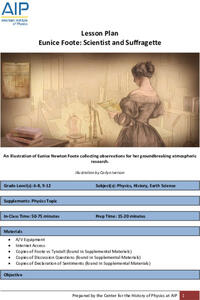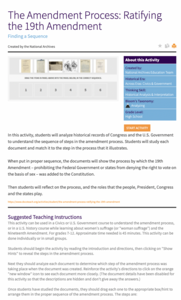National Endowment for the Humanities
Themes in Lord of the Flies
William Golding's Lord of the Flies is the anchor text for a lesson that teaches readers how to distinguish between a literary topic and a literary theme. Using the provided worksheets, groups first chart some themes and propose a...
National Endowment for the Humanities
Characterization in Lord of the Flies
Readers of Lord of the Flies hunt down direct and indirect examples of how William Golding brings his characters to life. After instructors guide learners through the process of collecting evidence of these two types of characterization...
National Endowment for the Humanities
Symbolism in Lord of the Flies
Readers of Lord of the Flies examine the four main symbols William Golding develops in his novel: the island, the conch, the Lord of the Flies effigy, and fire. Partners select one of the major symbols and create an image by adding words...
National Endowment for the Humanities
Edgar Allan Poe, Ambrose Bierce, and the Unreliable Narrator
Stories by Edgar Allan Poe and Ambrose Bierce provide readers with an opportunity to investigate unreliable narrators. The lesson plan begins with an activity about different types of point of view and continues as scholars apply their...
National Endowment for the Humanities
African-American Communities in the North Before the Civil War
Middle schoolers may be surprised to learn that before the American Civil War there were more slaves living in New York than there were in Kentucky! Young historians examine maps and census data to gather statistics about...
Learning for Justice
Marian Wright Edelman
Marian Wright Edelman's 2014 Commencement Speech at Lewis and Clark College serves to inspire young scholars to investigate a problem in their community, to determine why the problem is important, and then to develop a plan for one thing...
Learning for Justice
Mary McLeod Bethune
Young historians conduct a close reading of the text of an interview with Mary McLeod Bethune, the daughter of former slaves who taught herself to read, grew up to establish schools for other Black women, and went on to become an advisor...
Newseum
Is It Fair?
Young journalists learn how to analyze word choice, context, and counterpoints to judge the fairness of a news story. They practice using these tools to judge a series of headlines for the story of Goldilocks and the Three Bears. They...
Anti-Defamation League
Student Dress Codes: What's Fair?
The controversy over school dress codes continues. The debate involves questions like, why is there a policy? Who sets the policy? Who enforces the policy? What is a fair policy? Tweens and teens have an opportunity to engage in the...
Anti-Defamation League
Is Olympic Coverage Sexist?
Women Olympians have come a long way since 1900 when 22 women competed for the first time. News coverage of the Olympics has also changed dramatically. What has been slow to change, however, is the language used in the coverage of female...
K20 LEARN
Plantation Life And Slavery: Antebellum Era
Learners evaluate primary sources from the antebellum era to determine the accuracy of textbooks. They examine narratives from enslaved people, then compare them to their own text. Extension activities include the opportunity to write a...
Anti-Defamation League
Soccer, Salaries and Sexism
Call it soccer, call it football, but call it unfair! the US women's soccer team has called out the US Soccer Federation for unfair treatment in terms of salaries, support, and working conditions in a lawsuit filed in 2019. Young...
K20 LEARN
Blue or Gray? Perspectives on the Civil War
Using primary and secondary sources, such as letters and diaries from soldiers and civilians, learners consider why people fought in the American Civil War. A role-playing Historical Mingle activity, as well as discussion questions and...
Learning for Justice
Mary Church Terrell
Excerpts from an 1898 speech by civil rights activist Mary Church Terrell offers young scholars an opportunity to investigate how Black American women fought for civil rights long before Rosa Parks and the civil rights movement of the...
Learning for Justice
Maya Angelou
Maya Angelou's poem, "Still I Rise", offers young scholars an opportunity to consider how poets use literary devices to create powerful messages. After a close reading and discussion of the poem, class members reflect on how they can...
Teaching Women's History
Georgian Women
Britain was and is a stratified nation. History sleuths investigate the Georgian Era (1714-1830) of British history to gain an understanding of how the roles women played during this period were influenced by class, race, and religion....
US National Archives
Susan B. Anthony and the Struggle for Suffrage
Susan B. Anthony was willing to break the law to gain voting rights for women. Young historians investigate Anthony's willingness to go to jail to draw attention to the suffrage movement. They read and discuss primary source documents to...
Teaching Women's History
Medieval Women
Not all the women in the late Middle Ages (1400-1510) lived lives of quiet desperation. Young historians study images and read primary source documents to gain an understanding of what life was like for the elite class of medieval women.
American Institute of Physics
Eunice Foote: Scientist and Suffragette
The greenhouse effect and climate change are hot topics in today's news. Young scientists may be surprised to learn that the concept is not a new one. In fact, Eunice Newton Foote, scientist, inventor, and suffragette, discovered the...
Anti-Defamation League
Harriet Tubman on the $20 Bill: The Power of Symbols
How important are symbols and symbolic gestures in society? Middle schoolers have an opportunity to analyze the importance of symbols on American currency with a lesson that investigates the controversies surrounding redesigning the $5,...
DocsTeach
The Amendment Process: Ratifying the 19th Amendment
The process for adding an amendment to the U.S. Constitution is long and arduous, by design. High School historians study a series of documents about the Nineteenth Amendment and, using an interactive program, drag the documents onto a...
DocsTeach
Women of Color and the Fight for Women's Suffrage
Introduce young historians to primary source analysis with a lesson that teaches them how to use a four-step process to analyze a photograph of a 1913 Suffrage Parade. Groups practice the process and share their observations with the...
DocsTeach
Fannie Lou Hamer and Voting Rights
To understand the challenges Black voters faced in Mississippi, middle schoolers first gather background information about Fannie Lou Hamer and then read her testimony given during the 1964 Democratic Nation Convention. After a...
PBS
Remembering Nelson Mandela
To learn more about Nelson Mandela, young historians watch a 20 minute video that traces his life from boyhood in a small South African village, to his work as an activist opposed to Apartheid, his imprisonment, and to his leadership as...

























